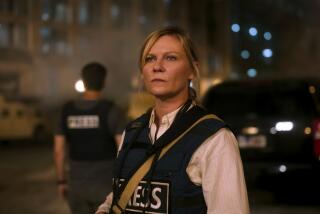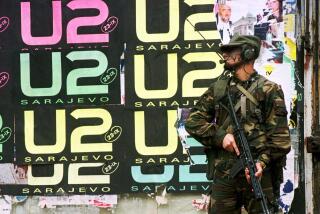‘Young@Heart,’ ‘Heavy Metal in Baghdad’ rock in hard places
They sound like mockumentaries, variations on that comedic standard-bearer “This Is Spinal Tap.”
“Young@Heart,” a documentary opening today, follows the run-up to a new concert by a chorus of New England senior citizens who cover, to bizarre and then bizarrely powerful effect, songs by Sonic Youth and the Clash.
Meanwhile, “Heavy Metal in Baghdad,” a documentary slated for release next month, is about the “only heavy metal band in Baghdad” -- four twentysomething Iraqis seeking that most basic of Western freedoms -- to rock, free of reprisal, like their metal gods Metallica and Slayer.
By chronicling the rise of pop music in these unlikely contexts, both of these unusual documentaries shine a light on subjects from which most Americans would prefer to avert their attention: old age in “Young@Heart” and the Iraq war in “Heavy Metal in Baghdad.”
“Young@Heart,” which was picked up for distribution by Fox Searchlight after it screened at the Sundance Film Festival, is a making-of concert movie; we watch as the singers -- in their 70s, 80s and 90s -- prepare for their latest tour, bending their minds around Sonic Youth’s discordant “Schizophrenia” and the Talking Heads’ “Life During Wartime” (the chorus performs at the Wilshire Theatre in Beverly Hills on April 17).
What gives the film its dramatic structure is the fragile condition of the singers themselves. Fred Knittle, for instance, 81 and suffering from congestive heart failure that requires the companionship of an oxygen tank, is slated to do a duet with Bob Salvani, who’s just survived hospitalization for spinal meningitis. Fittingly, the song is Coldplay’s ballad “Fix Me.”
Still, “it’s not social work, this is about creating art,” said Stephen Walker, the film’s director, interviewed along with Bob Cilman, the musical director of the chorus.
Cilman started Young@Heart in 1982, when it drew members solely from a residence for the elderly in Northhampton, Mass. By the time Walker saw Young@Heart onstage in London in 2005, Cilman had built the act into a phenomenon with European tour dates. Now they have an album, called “Mostly Live,” where they cover the Police’s “Every Breath You Take” and Radiohead’s “Fake Plastic Trees” -- a song, Cilman said, over which the group has squabbled deeply.
“They think it’s about abortion, for some reason,” he said.
In the spotlight
“I think the goal is to let them be old in a different way so people will take notice,” he said more expansively. “You know, we don’t look at the elderly at all in this country; we hide them as much as we possibly can. And here now people are looking at them.”
Among the fascinating byproducts of putting contemporary rock and pop songs in octogenarian hands is the way it exposes the lyrics to an unusual scrutiny. In “Young@Heart,” the will to master Sonic Youth becomes equated with the will not just to survive but thrive. It’s a theme that runs through “Heavy Metal in Baghdad” as well, where the fledgling Iraqi metal band Acrassicauda (Latin for “The Black Scorpion”) dreams of emulating Metallica, Slayer and Slipknot.
When their basement practice space is destroyed as the security situation in the city worsens to the point that even meeting proves dangerous, we see what Operation Iraqi Freedom has meant to these four Iraqi youths.
By chronicling Acrassicauda’s plight, the filmmakers, 36-year-old Eddy Moretti and 38-year-old Suroosh Alvi, present a bracing, slacker’s-eye view of the Iraq war that penetrates the typical prism offered by mainstream news. Much of this has to do with the film’s genesis. “Heavy Metal in Baghdad,” which has been playing festivals and will be released theatrically in May, was born out of an article in Vice magazine, the free monthly that Alvi co-founded in 1994.
Vice has since blossomed into a multifaceted media company, with a film arm and a website, vbs.tv, of original streaming content. The company prides itself on being plugged into youth subcultures around the world in ways the mainstream media is not.
“Heavy Metal in Baghdad” has this Rough Guide to geopolitics and pop culture spirit. Indeed, Acrassicauda’s story was originally supposed to accompany others in the Middle East that fit the criteria -- a mash-up of youth culture and far-flung politics -- for the Vice spinoff book and DVD, “The Vice Guide to Travel.”
These included a skate park in Beirut presumably affiliated with Hezbollah and a guy who claimed to be a Boy Scout leader for PLO youth. Amid this, Moretti and Alvi were corresponding with Acrassicauda as the chaos and violence in the country spread.
“I think we were drawn to the anomaly,” said Moretti, interviewed in the Brooklyn headquarters of Vice. “Like, heavy metal in Baghdad? Weird.”
“There’s something about heavy metal, and hard rock, that is appropriate for that place and that culture,” said Alvi, the Canadian-born son of Pakistani parents. “Because it’s kind of very male, and Arab culture is very patriarchal, and there’s like a lot of dudes.”
Into Baghdad
Both credit director Spike Jonze, whom the company lists as a creative director for vbs.tv, as a galvanizing force behind doing “Heavy Metal in Baghdad” as a documentary feature (the band, living now on the margins in Istanbul, has a blog at www.heavymetalinbaghdad.com).
The film includes Moretti and Alvi’s own trip to Baghdad, which took place in September 2006, with sectarian violence raging. In what plays like a mad, Hunter S. Thompson adventure, the duo reach Baghdad by way of Irbil, in Kurdish-controlled Iraq, then hire a security team at $1,500 a day, which can be seen loitering nervously at the filmmakers’ hotel when not escorting them for brief, tense trips into the city.
Moretti and Alvi do get two of the Acrassicauda members to come to the hotel; two others have fled to neighboring Syria. Eventually the band will reunite there, but as part of the massive Iraqi refugee population, caught between grim conditions and bad options. For these young rock dreamers, the question in the Clash song -- should they stay or should they go? -- has a tortured relevance.
More to Read
The biggest entertainment stories
Get our big stories about Hollywood, film, television, music, arts, culture and more right in your inbox as soon as they publish.
You may occasionally receive promotional content from the Los Angeles Times.





